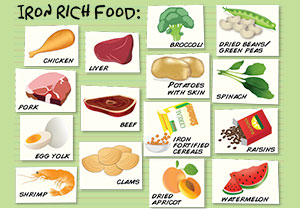What are vitamins and what do they do for our body?
Vitamins are very small compounds that our body uses for every function such as using food for energy, growth and development of our body and proper immune function.
Some vitamins are classified as fat-soluble which means they can be stored in our body for later use, some are water soluble which means they can not be stored in our body and we need to have these on a daily basis for optimum health.
Vitamin A
Vitamin A is an important vitamin for our eyesight, keeping our immune system working well and is also important for healthy reproduction and the development of the fetus.
Am I at risk?
Vitamin A deficiency is common in Fiji due to the limited access to foods high in this vitamin, and health problems are mostly seen in times of high nutritional need – infancy, childhood, pregnancy and breastfeeding. Vitamin A deficiency can lead to increased severity of infections and childhood blindness. Those that are deficient in Vitamin A are often deficient in Iron, putting them at risk of anemia.
What foods can I use to get more Vitamin A every day?
- Kumala (sweet potato) and carrots
- Green leafy vegetables such as watercress, bele, spinach and chinese cabbage.
*TIP Replace a portion of roots crops with some boiled or steamed kumala
Zinc
Zinc is an essential vitamin for proper immune function, wound healing, energy production, mental functioning and DNA synthesis.
Am I at risk?
Zinc deficiency is difficult to test for, but some people are at higher risk than others. Having a diet that is high in nutrient poor, processed foods that are not fortified with zinc and a diet high in foods grown in zinc deficient soil may place you at risk of deficiency. Zinc losses may also occur if you have diarrhoea for an extended period of time.
What foods can I use to get more of these vitamins every day?
Oysters, shellfish, red meat and poultry are great sources of Zinc, as well as nuts (cashews and almonds), milk and whole grain foods. Baked beans, tofu and chickpeas also contain zinc and are good alternatives to meat.
*TIP
- Make use of freshly caught shellfish a few times a week to increase your zinc intake
- A small handful of unsalted cashews or almonds make a convenient and healthy snack that is heavy in vitamins and minerals including zinc
- Soak some dried beans or chickpeas and add these into curries, stews, salads and sandwiches (or anything else you like!) for an extra boost of zinc.
Iodine
Iodine is used by our bodies to produce thyroid hormones whose job it is to regulate our metabolism – how quickly or slowly our body processes the food and drinks we consume. It is essential that we have Iodine in our diet, as our body is unable to make it.
Am I at risk?
Our requirement for Iodine increases during pregnancy and Iodine deficiency during pregnancy is the leading cause of mental retardation and intellectual disability in infants and children.
As Iodine is responsible for the proper functioning of the thyroid gland, all symptoms of Iodine deficiency are related to thyroid function. Some of the symptoms are: Goiter (enlargement of the thyroid gland in the neck), which can lead to breathing difficulties and choking.
What foods can I use to get more of these vitamins every day?
- Seafood is one of best sources of Iodine, and having 2-3 serves per week will contribute to your iodine intake.
- Seaweed, dairy products, eggs are also a source of iodine.
- Although it is not recommended to add salt into your cooking and onto meals, if you do use salt, make sure it is iodised salt.
- Vegetables can also be a good source of iodine if grown in soil that contains iodine.
Do I need an Iodine supplement?
It is best to discuss with your health professional if you could benefit from an Iodine supplement, as there are some cases where too much Iodine from supplements can be harmful to your health. A healthy, balanced diet should give you all your Iodine needs, however, as our needs increase in pregnancy and breastfeeding, if you fall into one of these categories and you also find it difficult to eat a good variety of whole foods, you may need an Iodine supplement.
Iron
Iron is responsible for the transport of oxygen throughout our blood and is responsible for keeping our immune system strong and giving us energy throughout the day. Not enough iron can lead to fatigue and increase our susceptibility to illness, however too much iron can lead to iron toxicity. It is important to see a doctor if you think you may be iron deficient, as taking a supplement without a diagnosis can be harmful to your health. In Fiji, Iron deficiency is a big problem with 50% of children under 5 and 40% of women being iron deficient.
Iron comes from both animal sources (haem iron) and plant sources (non-haem iron), haem iron is more easily absorbed by our body. If your iron intake is from plant sources only, then you may need much more iron as it is not as well absorbed.
Am I at risk of iron deficiency?
Those at risk of not having adequate iron include:
- Women and children under 5 (meaning proper iron intake when pregnant and breastfeeding play a big role in giving your child enough iron)
- Vegetarians or vegans, who have poorly managed diets without meat substitutes.
- People who have experienced heavy blood loss through injury or menstruation or who regularly give blood.
- Pregnant or lactating women who have an increased need.
- Adolescents experiencing a growth spurt where there is an increased need for iron, among other vitamins and minerals.
- Athletes also have a higher requirement for iron.
How can I ensure I am getting enough iron?
Include iron rich foods such as red meat, poultry and fish. Plant sources of iron include dark green leafy vegetables, nuts and seeds, dried beans and peas and iron fortified bread and cereal products.
Combine foods that are high in vitamin C, such as fruit, citrus and tomatoes, with foods high in iron as it increases the absorption of the iron.
Avoid drinking tea around the time of consuming iron containing foods as tea can block the absorption of iron.
Vitamin Supplements
If the food you eat each day has a variety of colors and is from a range of the different food groups (See our section on Eating Healthy) then you should be getting enough of each of the vitamins and minerals. It is always best to get your vitamins and minerals from the food you eat, however, there are certain groups of people who may need vitamin supplements – these are:
- Pregnant women or women who are breastfeeding
- People who do not consume enough of a variety of foods from the food groups, for example, no meat or no dairy (see Eating Vegetarian)
- People with a chronic disease or a diagnosed vitamin deficiency
You should first discuss your need for vitamin supplements with a qualified health professional as more is not always best and too much may cause harm, especially Vitamin A and Iron.
See our sections on Iron Deficiency and Micronutrient Deficiency on this website.
References and Further Reading:
Nutrient reference values for Australia and New Zealand:
Dietitians Association of Australia, Nutrition A-Z, Anaemia
World Health Organisation – Micronutrient Deficiencies
Better Health Channel – Vitamin and Mineral Supplements
World Health Organisation – Vitamin A Deficiency
Better Health Channel – Iodine
Better Health Channel – Iron Deficiency


